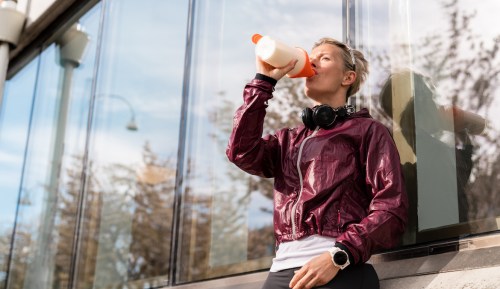Taking a Pre-Workout Supplement? You Might Not Be Getting the Ingredients You Think You Are
A new study shows that pre-workout supplement labels often don’t accurately reflect what the bottles actually contain.

My husband is a general skeptic of vitamins and supplements, but a few times a week, he takes a pre-workout supplement powder that I like to call the “pink stuff.” Mixing half a small scoop with a glass of water creates a drink that tastes like pink lemonade and gets him fired up to hit the gym and, supposedly, get the most of his workout (whatever that means).
Experts in This Article
associate professor of medicine at Cambridge Health Alliance and researcher specializing in supplement safety.
Recently, it occurred to me to ask him, “Do you actually know what’s in the pink stuff?” Because just like the supplement industry as a whole, the Food and Drug Administration (FDA) says it “does not have the authority to approve dietary supplements for safety and effectiveness, or to approve their labeling, before the supplements are sold to the public.” Meaning, that what supplement makers put in their bottles, and what the label says is in their bottles, is totally up to the supplement makers themselves. Unsurprisingly, this results in a lot of supplements not actually containing what those labels claim.
A new study has found that the most cutting-edge products in the sports performance category of supplements are no different—with potentially dire consequences. Of the 57 performance supplements that were tested, the contents of only 11 percent were true to the labels, while the remaining 89 percent either didn’t contain the listed ingredients, or contained them in doses varying from 0.02 percent to 334 percent of the labeled quantity. Meanwhile, 12 percent of the products contained ingredients that have been banned by the FDA.
“Consumers were as likely to get an FDA-prohibited drug off the stimulant instead of getting an accurate amount of the ingredient listed on the bottle,” Pieter Cohen, MD, a Cambridge Health Alliance professor and a study co-author, says.
The study, published in the Journal of the American Medical Association, analyzed performance supplements that advertised themselves as “pre-workout,” “metabolism boosting,” “fat burning,” “bodybuilding,” and other claims. The researchers honed in on these supplements in particular because they contained five buzzy and relatively new plant-based ingredients serving as “alternative botanical compounds for sports enhancement” to the banned stimulant ephedra. Essentially, supplement makers are beginning to advertise botanical ingredients—R vomitoria, methylliberine, halostachine, octopamine, and turkesterone—that will get you juiced for your workout like a stimulant.
“Manufacturers are promoting [these ingredients] as potentially the next emerging thing,” Dr. Cohen says. “What we try to do with a study like this is get ahead of the problem before these ingredients get incorporated into thousands of different workout supplements.”
And the problem is real: In a 2015 study done by the Centers for Disease Control and Prevention Cohen says a disproportionate amount of the 23,000 supplement-related emergency room visits were linked to performance supplements.
With this new study, researchers were not actually testing for the safety or efficacy of the botanical ingredients; the aim was to see if supplements were accurately labeled. However, “even if they’re accurately labeled, that does not mean they’re safe, and does not mean they’re effective,” Dr. Cohen says. “The manufacturers are permitted to include a countless number of these kinds of plant-derived ingredients. And it does not mean that the FDA has checked out that these are safe to use or will help any workouts.”
“Even if they’re accurately labeled, that does not mean they’re safe, and does not mean they’re effective.” –Pieter Cohen, MD
But if you were hoping to get your hands on a supplement with these ingredients, you’re probably out of luck there, too: 40 percent of the supplements did not contain any significant traces of the listed ingredients. Meanwhile, another 49 percent did contain the ingredients, but at wildly incorrect doses, ranging from barely any to over 300 percent of the listed amount. That dosage matters because the effectiveness and safety of supplement ingredients are tied to the amount. Too little, you won’t see much effect. Too much, and—in the case of a stimulant—you could be straining your body’s cardiovascular system, which can be fatal.
Dr. Cohen gives the example of caffeine: A cup of coffee is perfectly safe, while a teaspoon of powdered caffeine can actually kill you (which is why the FDA has told companies to stop selling powdered caffeine).
“Some companies are just putting some fancy names on the label, and then selling nothing, so it’s just a waste of money, but that shouldn’t cause any health risks,” Dr. Cohen says. “Other companies are like, well, let’s do whatever we can to try to get the consumer to feel like they’re getting a better workout, or feel like there’s something potent in this product. So you might do that by giving a big dose of caffeine and then by using stimulants that are not approved by the United States.”
Of the five FDA-banned substances found in the supplements that were tested, one is a drug available in Russia, three were stimulants previously available in Europe, and one has not been approved for use in any country. (One product even contained four different FDA-banned substances.)
So what can you do if you’re looking to get a pre-workout boost via a supplement? The best recourse is to stick to protein shakes, creatine, and/or amino acids, since they tend to be less risky, says Dr. Cohen. Otherwise, you want to make sure your supplements are certified by independent testing bodies, like the USP or NSF certifications.
As for the pink stuff? It turns out it’s NSF-certified. Phew.
Sign Up for Our Daily Newsletter
Get all the latest in wellness, trends, food, fitness, beauty, and more delivered right to your inbox.
Got it, you've been added to our email list.










